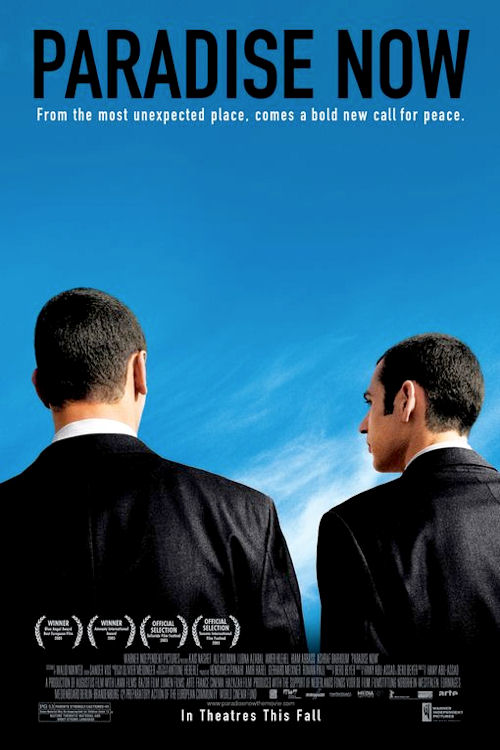Anthony's Film Review
Paradise Now (2005)

Paradise Now presents an intriguing human drama that is beautifully shot...
If you pay attention to world news, you will notice one conflict that has been going on for decades and continues to get media coverage: the violence between the Israelis and Palestinians, who for years have been in dispute over various issues mostly related to land territory. The degree to which the conflict has been reviewed and discussed has left many people around the world, not just in the Middle East, divided over their opinions about how to resolve the conflict. There are those who side with the Israelis, individuals who support the Palestinians, people who favor both groups, and those who have no opinion of the issue. Even if we step away from news media and jump into the world of artistic filmmaking, there can be individuals who decide to portray the issue from a specific viewpoint.
The 2005 drama film Paradise Now is such an example. Shot in actual Palestinian territories and spoken in Arabic, Paradise Now gives the rest of the world a glimpse into the psychology of Palestinians who feel that Israel, being an occupier, is the enemy. What's great is that it portrays such people with humanity. People who might assume that the Palestinians are heartless and violent might want to check out this film. That's not to say that the Palestinians in this movie are flawless people. Rather, the film presents both sides of their mindset so that we can understand the sorrow that turns these people into suicide bombers and the rationale for such violence that should be questioned.
Paradise Now presents two young Palestinians named Said and Khaled. They are close friends who work in a run-down auto repair shop and live with poor families. The poverty of their setting is made quite clear with the film's shots of Palestinian territory, including old houses, small shops, and a chain-link fence marking a border between Israeli and Palestinian territory. As we let these images sink in, another character enters the scene. A man named Jamal, who is a close friend of both Said and Khaled as well as a member of a Palestinian martyr group, assigns the two men as suicide bombers for an operation to take place in Tel Aviv, Israel, the next day. This part of the film is quite interesting to see because, for the Palestinians who feel that their lives have no meaning, the notion of killing Israelis seems trivial, even justified.
Things get even more interesting when Said and Khaled go through a hole in the chain-link border fence, nearly run into Israeli forces, and get separated from each other. With the operation foiled by bad luck, Khaled scrambles to locate Said, who ultimately cannot decide whether to proceed with his bombing mission or flee from it. While this part of the movie can be seen as a political thriller, it's definitely more of a human drama that explores some philosophical questions. For example, will murdering Israelis ultimately make things better for the Palestinians? Can fighting lead to peace? Is there really a paradise once a suicide bomber completes his mission?
One character in this film is no doubt the voice of reason: a young woman named Suha. She appears in a couple of scenes as someone whom Said is in love with. Her role is important in two key scenes: one where she is talking to Said in her home and one where she is talking to Khaled in a moving car. In both instances, Suha expresses her pacifistic views of the Israeli-Palestinian conflict, and she makes some very good points that Said and Khaled might counter. For example, the notion of paradise is just in one's head, not an actual place they can live in after killing Israelis, to which Khaled says that it's better than the hell they're already living in. Once Suha presents her side, we in the audience anxiously wait for the answer to the final question. Will Said and Khaled ignore Suha and kill people in Tel Aviv, or will they see the light and save themselves from a needless death?
This film, even with a running time of just 90 minutes, manages to make us think about and comprehend the intricacies of the Israeli-Palestinian conflict from a side that Western media sources might be tempted to dismiss. It's also a touching drama about people who are longing for things to get better, whether or not they make the right decisions in life. And, perhaps most importantly, Paradise Now is a call for peace, reminding us that people of all sides of a conflict are equally human who want nothing more than happiness in their lives. This is a film that, I think, ought to help steer the Israeli-Palestinian conflict towards a peaceful resolution. But even if it ultimately doesn't, it's still a memorable film that sheds light on a part of the world that we might not fully understand.
Anthony's Rating:










For more information about Paradise Now, visit the Internet Movie Database.
Home
Film Reviews
Other Reviews
Commentaries
Links
About AFR
RSS Feed
Privacy Policy
E-mail Anthony











